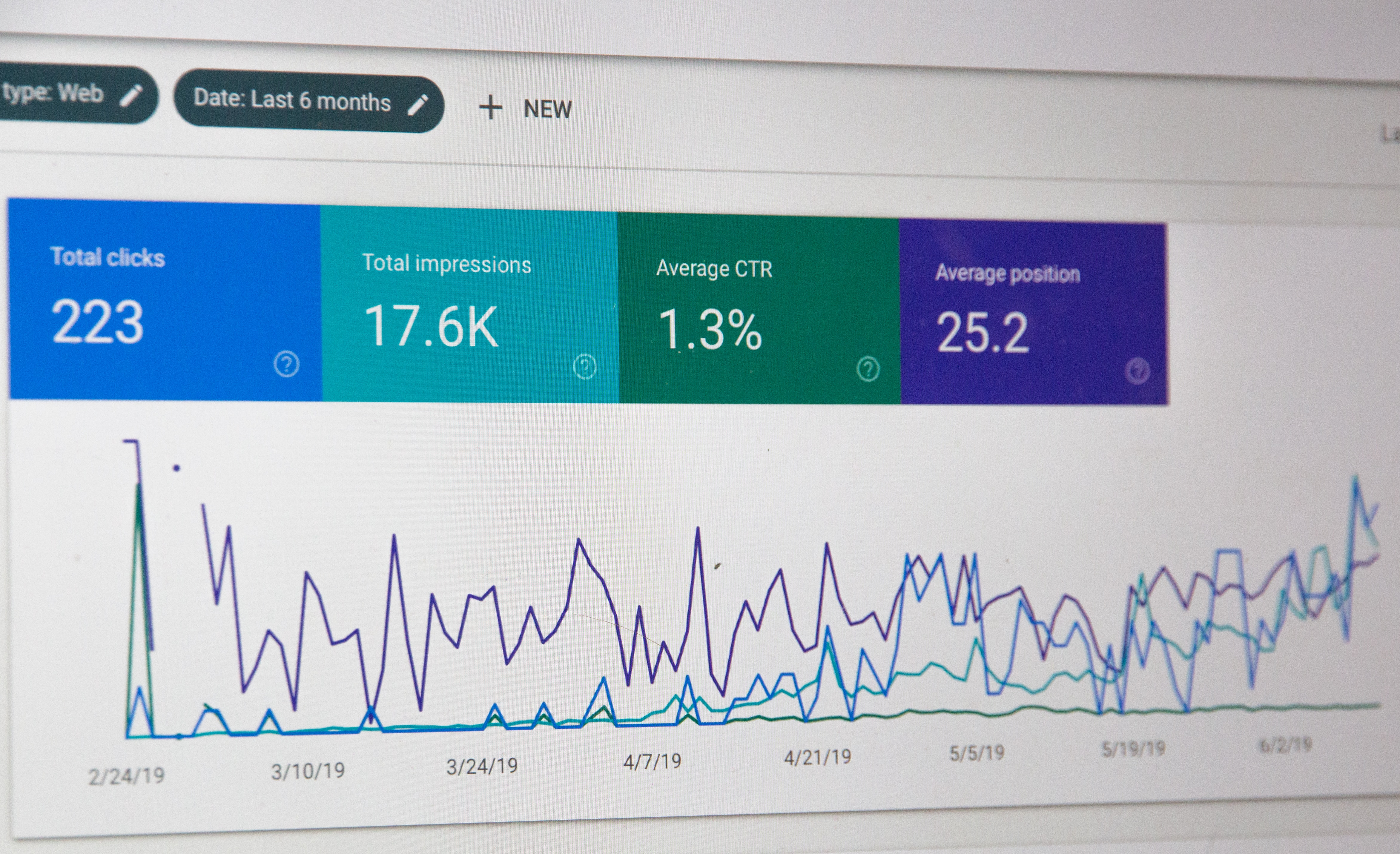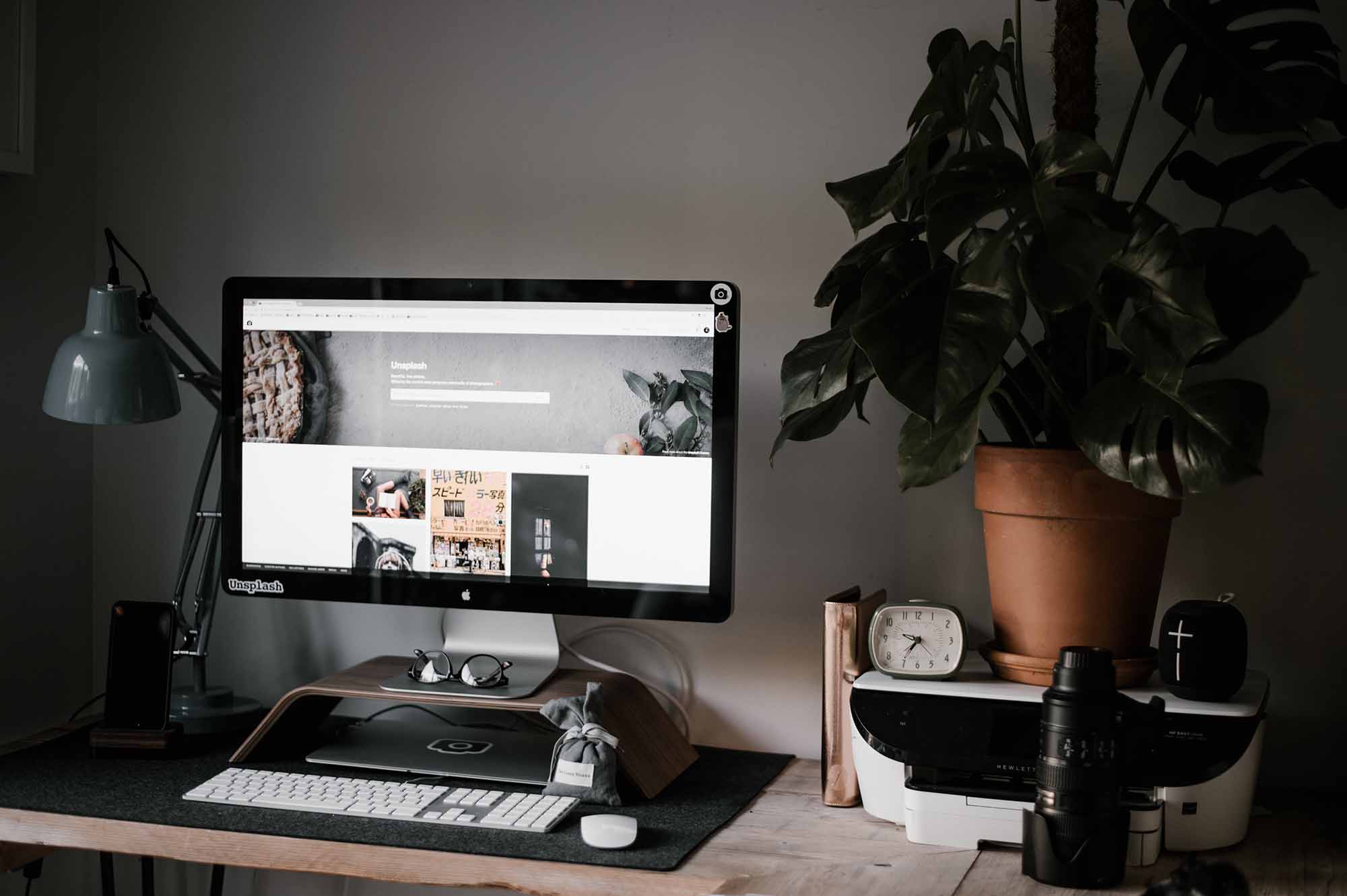Foreword: This guide is long. But it's going to be something that will change your businesses future. Doing SEO for over 9 years now I've come to learn two main things:
1) Most small businesses can, and should be doing 80% of SEO themselves (until they grow to exceed $100,000 in revenue per anum).
2) Most SEO agencies copy what they see in America. This is very ineffective for New Zealand and leads to most SEO work leading to little or no results.
This guide will teach you exactly how to save yourself $6,000 in SEO services, generate a consistent stream of leads coming to your and finally help you set up systems and processes that will increase your companies valuation by at least $50,000.
Why are doing this? Because we care. We've been a small business struggling to pay the bills, hoping that the next coffee is going to be the one where we close big and to be honest it sucks.
Our goal is to help as many small businesses and startups gain the traction they need to grow. To not have to worry about paying the bills and instead be able to focus on doing what they love.
Excited? Sounds like something you're going to love? Awesome. Let's get started!
The Ultimate Kiwi Guide To SEO
When I started Inbound business two years ago it was tough. The biggest stress for me was the same paradox as every startup and small business faces:
To get more customers, you need to spend more on marketing. But how can you spend more if you don't have any money to begin with?! This is the sole reason I had insomnia for a few months. I needed more customers but couldn't afford to advertise!
On top of this, trying to wade through the number of different marketing methods and traction channels is enough to drive any owner insane. SEO, SEM, sales, PR, content marketing, email marketing, affiliate programs, offline events, community building; the list goes on and on!
We've all been there before. Complete analysis paralysis.
Fortunately, on one of my sleepless nights frantically searching through Google figuring out the right traction channel, I stumbled on something. Google itself was releasing a massive update...
Google was in-fact launching a new feature that was making it easier for small businesses (physical AND online stores) to appear on the front page.
Now don't get me wrong, I've been delivering Search Engine Optimisation (SEO) as a service for 9 years now and before it was mainly reserved for the big brands with even bigger budgets. To put it nicely, SEO was never really small-business friendly, but Google wanted to change this.
Why? Because their priority is delivering the most relevant results, not just showing the company that paid the most and had the most content. Google was making the shift towards quality over quantity.
This was one of the biggest turning points in my business. By harnessing this new feature, I managed to start getting more customers... without needing to spend more on marketing.
That point is important so I'll repeat it and even bold it (expect more of this throughout my guide!), I managed to start getting more customers... without needing to spend more on marketing.
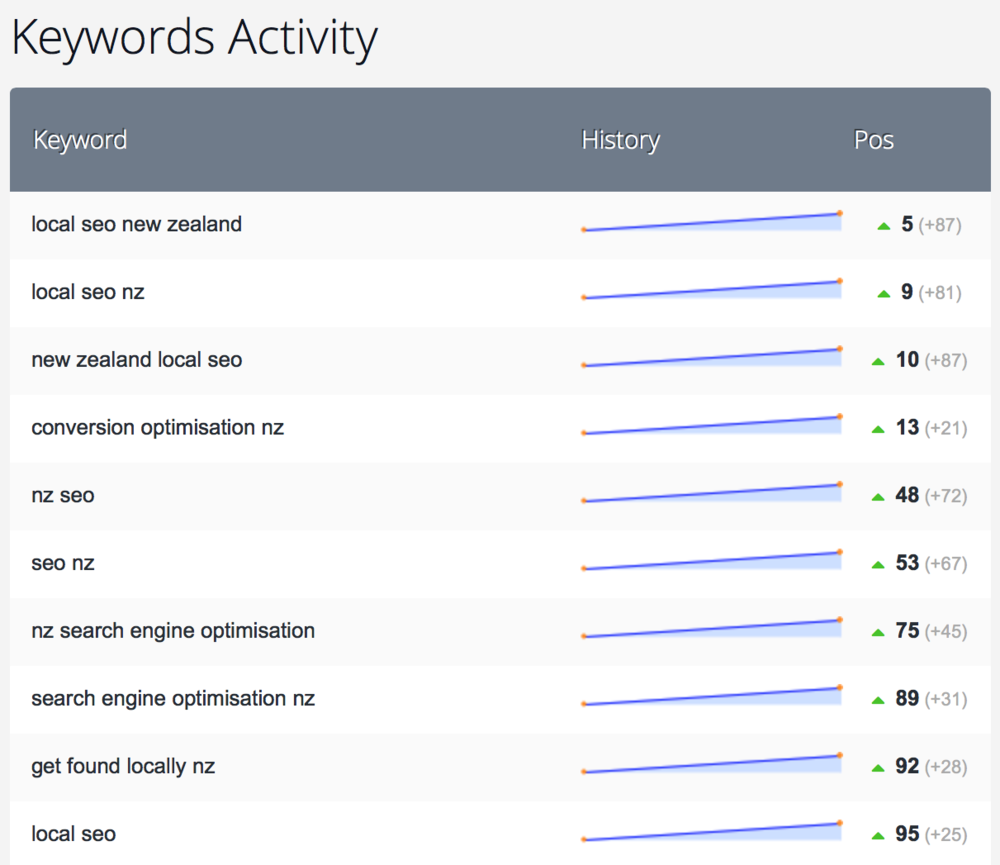
With this new shift, by doing a few simple things, I managed to go from 4 leads a month to 10+. This might not sound like much in regards to whole numbers, but with a simple shift and a couple of hours of work - this increased my revenue by 150%.
To give you an example of the power of being on the front page of Google, let me talk about a recent client I worked with.
Introducing The Car Dealership
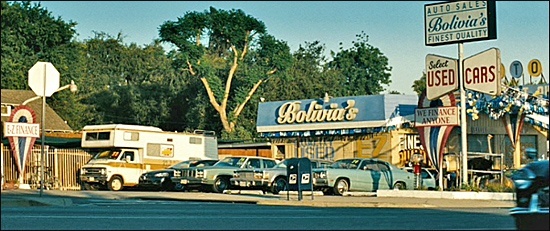
So this guy owns a car dealership in East Tamaki, and during our initial chat I told him the first thing he needs to do is leverage the power of this new change by Google.
He thought I was wasting his time so I went out and did it for free because sometimes it's nice to say 'I told you so.'
Within the first month he was ranking on the front page of Google and here is where it gets crazy: The keyword 'buy car Auckland' alone gets 2,000 searches every single month from local, targeted, and qualified leads.
This is quite a big deal if you're a car dealership. Even 100 more leads a month will change the business forever!
After I helped him reach the front page of Google, the number of local Auckland website visits went from 3 visitors a month to 211, the number of calls he received almost tripled and you can guess what happened to the number of sales he was making!
Below are the results from the first month...
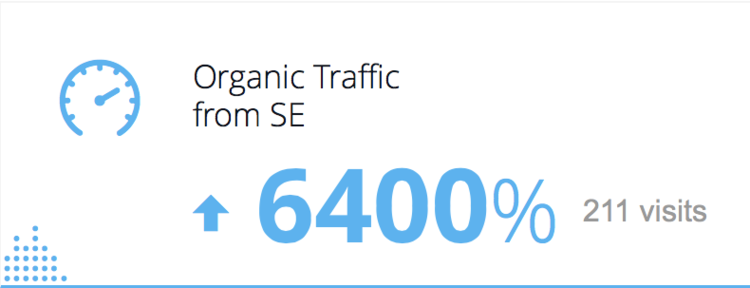
So here is something I need you to realize now: As long as your provide value, Google is trying to make it easier for you to get on the front page so take advantage of it!
Here is what happened to us when we leveraged local SEO in one of the most competitive industries online...
We went from the 9th page to the 1st page for the terms 'local seo nz', 'local seo New Zealand' and 'New Zealand local SEO' in one week...

In probably the most competitive industry online, these results are absolutely jaw-dropping!
What Can You Expect From This Guide?
Your endless head scratching is over. In plain English we explain exactly how to get your business on the front page of Google and how exactly you can take advantage of all the new features Google has released to help small businesses owners like you grow.
When I first talk to clients I always get a few funny answers when I ask them what they think their competitors are doing to get on the front page of Google.
Seriously... the answers range from 'the government' to 'magic'... I really like to think of myself as a SEO wizard but the answer is actually a lot more simple.
In this guide I'll be taking you through the exact process to get your business on Google Local which - if you take a glance at the two images pictured below and have a look at the orange sections - appears above the organic results and also has it's own review section, Google+ section and is highlighted to stand out of the ordinary results.
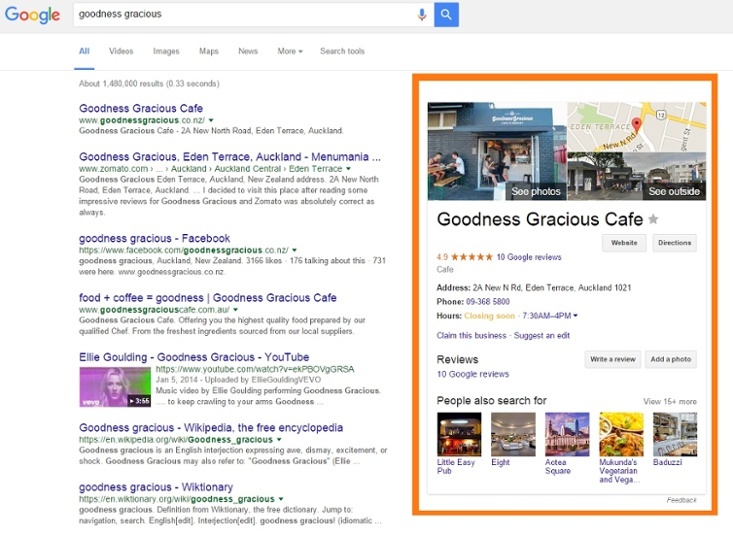
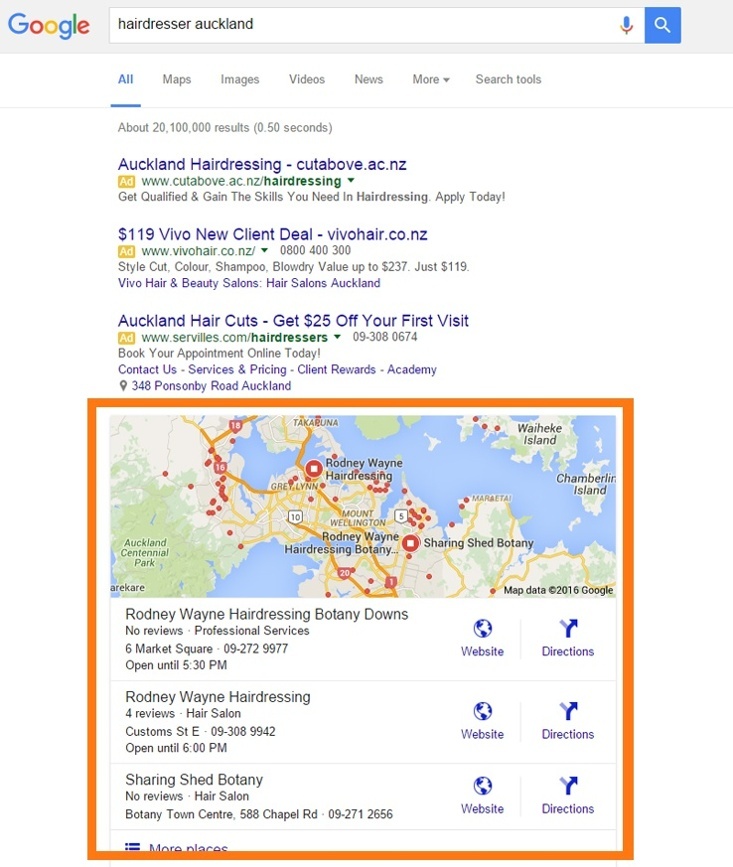
I'll also be taking you through step-by-step how to improve your conversion rate, double the amount of leads you're generating each month and ultimately help you succeed more online.
But before we dive into the fun stuff let me explain even more benefits of Google's new focus - Local SEO.
A Little Bit About Google
Google processes over 40,000 searches every single second which translates to over 3.5 billion searches per day and 1.2 trillion searches per year. So although search engine optimisation (SEO) includes all search engines like Bing, and Yahoo!, Google is the main focus because of its search domination.
This means that the majority of your customers are going to Google before making a purchasing decision whether it's to check out your competitors, to see reviews of your business or even to find the closest service in their area.
Take my recent journey to the car mechanic.
I've been burnt by mechanics in the past (and I'm sure you have too). I searched 'Car Mechanic Auckland', found a few of the closest ones and checked out their reviews. I even had a cheeky look at a few of their Facebook pages to see that they're alive and active.
Once I did some research I picked one that looked the best for me. Funny thing is that I drove an extra 10 minutes to get to the mechanic I chose - proximity wasn't a factor - I was after a trusty, highly reviewed mechanic that I felt comfortable with.
Turns out I made a great choice! And when you think about it, this is probably the same actions your potential customers take. It only takes 5 minutes, and if you're not appearing on Google when they're looking for you, you're going to lose their business.
This is what SEO is all about - optimising your website for search engines so they appear when people search for your product and service.
Another fun fact is that 97% of people won't check out the second page of results. If they don't find what they're looking for on the first page, they're more likely to try and search a different term than go to the second page. This means that if you're not on the first page, you're in trouble!
A Few Reasons Local SEO Is More Powerful Than Harry Potter
To understand why local SEO is so powerful we first must take a look at the behemoth Google herself. The search engine is around to serve one purpose: giving you the most accurate results for your search query.
If you're searching pictures of cute puppies, you want the picture below to come up.

The same goes for if you're searching for a hairdresser around your location. It makes sense to show the hairdressers in your area before it shows the hairdressers further away.
To exaggerate this point a little (and this actually used to actually happen a few years ago), if I was to search for a hairdresser and I'm in Auckland, it wouldn't be much help if the top results were hairdressers in the United States, Canada and London. It makes much more sense if the top results were hairdressers in Auckland.
This is how we know Local SEO is not going away. If anything there will be more emphasis on local results over the next few years, which means if you set this up today, you'll be reaping the benefits for the lifetime of your business.
What Is SEO?
SEO stands for Search Engine Optimisation. It's the process of trying to get a website to rank higher in search engines (mainly Google) for your product/service to generate a consistent stream of inbound leads. That means getting leads to come to you organically instead of forcing sales through outreach, cold-calling, mail drops etc.
Basically the goal is to get people to come to you.
Who Is SEO For?
In theory, SEO is for everyone. However, in practice this is not the case. SEO is best for those who are willing to put a bit of time and care into it. This may mean doing it all yourself. Often, it means entrusting it to others. Ultimately though, you have to work and set clear goals and strategies to move forward both your website and business ahead together.
Who is SEO Not For?
SEO is not for those who just want to dump it and leave it. While it’s not necessary to be involved with every stage of SEO and all the micro decisions, it is vital to stay in the loop. Keeping up to speed is incredibly important and necessary as this is the best way to make sure your SEO goals are aligned with your business goals. If you think you can go on Fiverr and buy 100 links, you should NOT be doing SEO.
Harsh Truth #1 - Don't Buy Cheap SEO
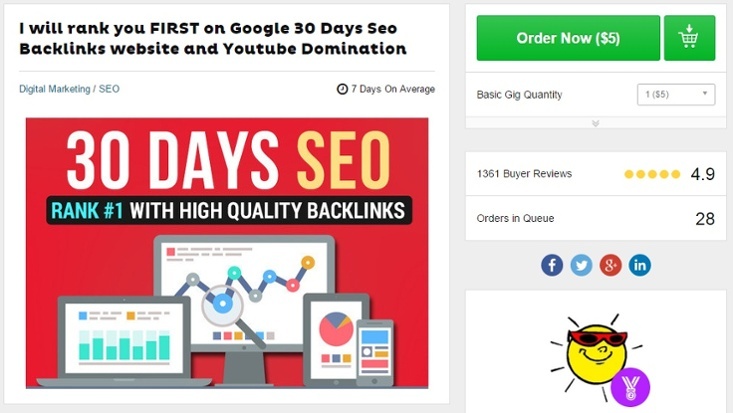
"But it says they'll rank me number one for just $5, and they have 1,000 reviews!"
They get good reviews by offering bonus links (which still do nothing) if you leave a 5 star review and for anyone that leaves a 1-star review they will offer a refund.
The links they offer are shared with thousands of other websites all over the world and link buying is considered black-hat in the eyes of Google. This means if you're caught, Google will literally remove your website from the search results.
If you're not caught, you get no benefit since the links are worthless so please for the love of kiwis, don't do this.
There is another harsh truth out there. The majority, nay (dare I say it? Yes I dare) 99%, of the companies out there promising SEO results out there in New Zealand are bad. Maybe not even just bad, but awful.
Often, even just for Google Adwords, they either won’t tell you what’s going on, not deliver results, or even in some cases not conduct face to face meetings unless you spend a certain amount of money.
This is not how good SEO is achieved and in all honesty is just a bad way to do business.
Harsh Truth #2 - Most SEOs Aren't Good At What They Do
Being in the business world you've probably heard some horror stories in regards to SEO. Either someone signed someone up to a 6 month contract that they can't get out of and they're stuck paying $1,000+ a month for no results, to an SEO actually hurting a websites rankings.
Just like every industry, there are bad SEOs. You expect mechanics to over-charge and under-deliver, you've heard of Apple products dying just after the warrenty expires and I'm sure you've heard of financial advisors that should NOT be financial advisors. Every industry has good companies and bad companies, the only downside with SEO is there's no standard.
Anyone with a laptop and some buzzwords can call themselves an SEO expert which is a big problem the industry is currently facing. So keep in mind that not every SEO is born equal.
And just so you know, a clear sign of a bad SEO company is one that buys cheap links and does naughty things like I mentioned above.
Below is an example from arguably the biggest SEO company in New Zealand:
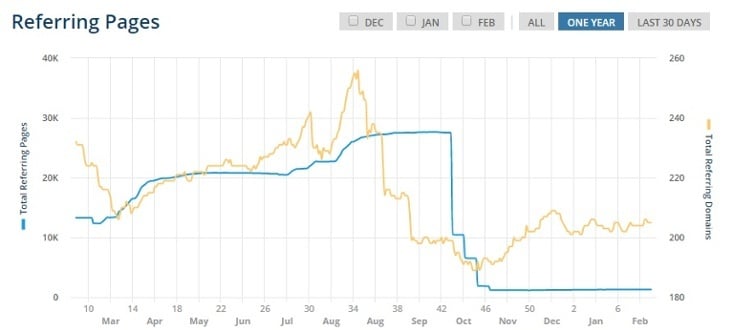
As you can see, they lost 16,000 links over the period of a few days. This is a clear sign of link buying and getting caught.
Also you can see their website contains over 1,000 critical errors and over 2,500 non critical issues. Do you really want this company managing your SEO?
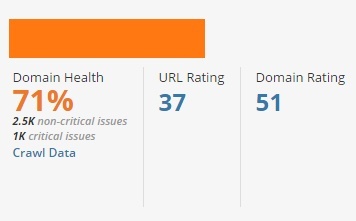
This is yet another reason why we educate our audience on SEO, so you can start to spot the good guys, from the bad. Early on every cent of money is important and this guide will help you put your money to work!
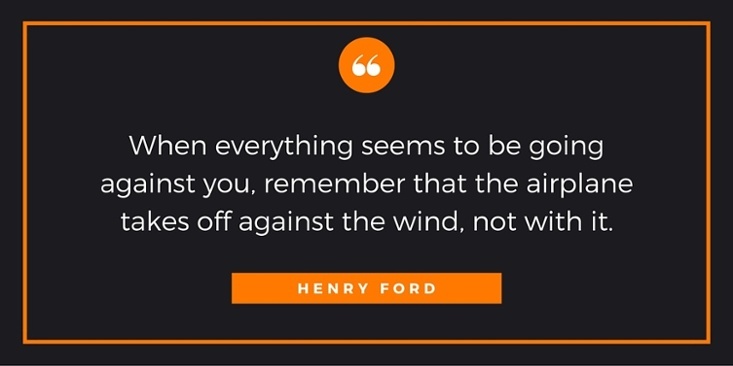
Getting Started
This resource is the ultimate tool designed for those unfamiliar with SEO.
It's also a road map to get from SEO zero to SEO hero.
You see - all marketers, business owners and entrepreneurs are at various levels of STUCK. There's simply too much to learn.
From beginner to seasoned pro - we are all looking to get better at what we do - always looking for an edge. It's our defining characteristic and an absolute must in the business world.
This page here is to help you not only master the beautiful world of SEO, but implement and succeed with it too.
With this system we've ensured success for every single one of our hundreds of clients.
It takes the guess work out of SEO and turns it from boring 'keyword density' to a way to really connect with your customers on a deeper level and ultimately add more to your bottom line.

The System
It's the same system Starbucks and Mcdonald's have used to corner the coffee and hamburger markets. It's the same system Amazon uses to dominate e-commerce. It's how The Warehouse, Xero and Air NZ have become household names.
This system works for small and enterprise level businesses. It works for mom-and-pop shops and billion dollar retailers. It works whether you sell traditional products, digital products or services.
This system works because it exploits each and every aspect of the irrefutable law of business growth put forth by legendary marketer Jay Abraham:
There are only three ways to grow a business:
- Increase the number of customers
- Increase the average transaction value per customer
- Increase the number of transactions per customer
We aren't going to simply teach you definitions of SEO and end there like 99% of other resources out there.
What we are going to teach you is exactly how to do SEO NZ the right way - like the companies that succeed.
You don't want to just appear on Google, you want to appear in front of customers that are pre-framed to buy your stuff! This requires strategy & smarts and we will lay it all out on the table for you.
This is the stuff they don't teach in business school.
SEO (The Professional Way)
These are the steps of successful SEO:
- Determine the Market Fit
- Do the Research
- Create the Content
- Setting up the Net
- Rinse and Repeat
When you're making your Twitter posts, writing your blog posts or launching your products and services, you need to constantly remind yourself of the this process. Otherwise, you'll be wasting time and money.
This is a warning: There is little profit in simply understanding concepts, for example, Pay Per Click (PPC). The enormous profit lies in applying these concepts in the right way like we will outline in this process.
Throughout this article we are going to pretend we are going to open a florist, a business that sells flowers (mostly to guys in trouble!), in Auckland.
So let's begin...
Step 1 - Determine Market Fit
There is nothing more important than choosing the correct market, simply because every part of the process is dependent upon the initial assumption - there is a group of willing and able buyers.
If you choose the wrong market, no matter how hard you try you will never get your first sale.
You were probably told at some point that you can build a profitable business around any topic you are passionate about.
Wrong.
If there is no sustainable market for your product or service, then everything you do will be a waste of time.
On the other hand, there are multiple ways to open a new market for each product.
If I am passionate about selling flowers to babies I'm going to run into a few problems: you're probably already giving me a weird look!
So how do I open up this market?
There are two options:
- Change your width
- Change your niche
Changing your width means targeting a wider market. While selling flowers to babies might be a very tiny market, selling flowers in general is a much bigger market. A cautionary note here: the wider the market, the more competition. I generally suggest to our clients to first target a different niche before they're ready to take on an entire market.
As the famed Peter Thiel said - "A valuable business must start by finding a niche and dominating a small market. Once they dominate that market, move to an adjacent market."
He goes on to share how Amazon's success started when they focused on becoming the biggest book depository in the world. Once they dominated the book market they moved on to CDs and by methodically following these steps they are now the biggest online store in the world!
Changing your niche means targeting a different audience in the same market. As a florist we could focus our next marketing campaign on men. Couple this with an approaching Valentines Day and we've got a recipe for success.
To confidently build a business around your market you must first determine whether:
- The market is big enough
- The market is monetizable
To determine the market is big enough you need to look for:
- Active blogs
- Active Facebook pages
- Active forums
- Active searches (roughly 5,000+)
To determine if the market is monetizable look for:
- Direct competition (Companies doing exactly what you want to do. This is good don't worry!)
- Indirect competition (They are selling to the same market but are selling a different product, like Toyota and Ferrari)
- Advertisers (Where there are advertisers, there is money)
- Gurus (Look for influential people associated with your market)
How To Find Active Searches?
Let's revisit our florist business.
There is a free tool called Google Adwords: Keyword Planner which we will be using. If you don't have an Adwords account, setup will take roughly 5 minutes and we'll be guiding you along the process.
Once you create an account you'll be forced to set up an ad. Move past these steps quickly and leave the ad paused. It's a free service but of course they want to push their services as much as possible.
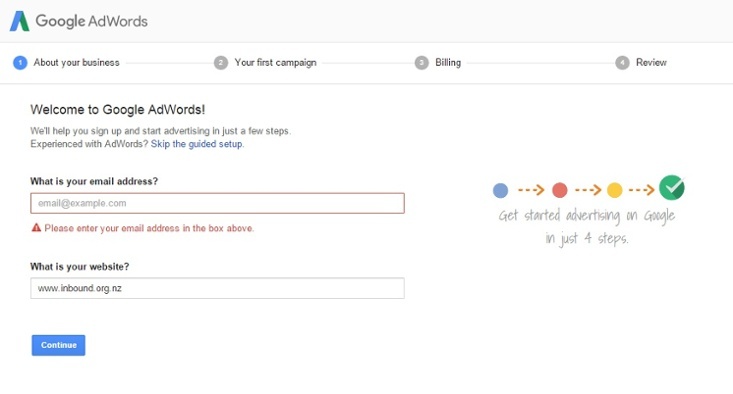
Now I clicked 'skip the guided setup' and got the page below. I simply quickly entered some details (as you might be able to tell, this ad would not be very effective as an ad campaign).
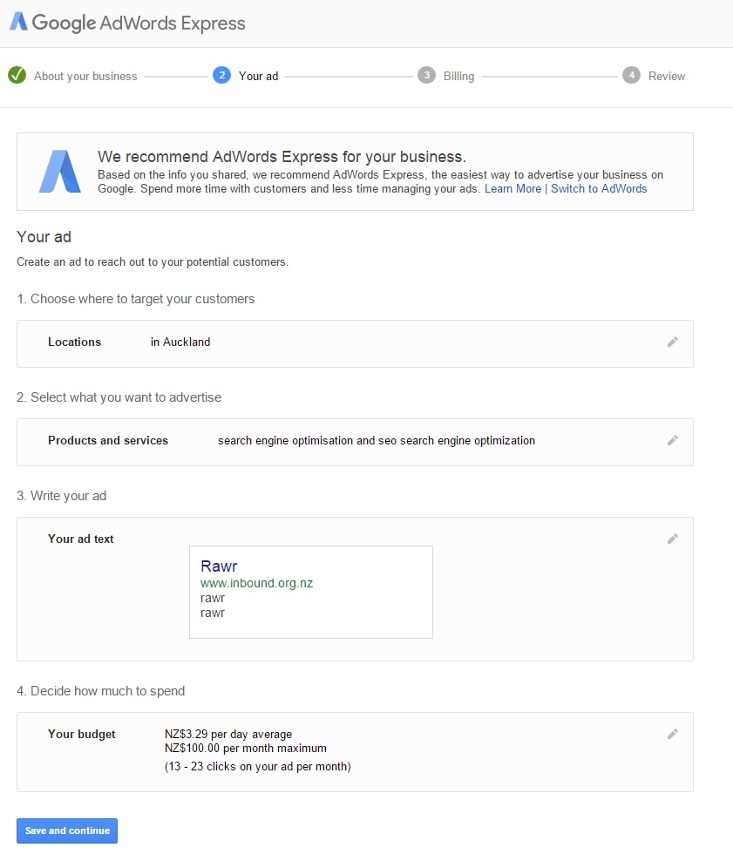
You're then taken to billing. Note you WILL need to enter your card details. If you pause the ad like I recommend, you will not be charged at all. Some of you might actually want to set up an Adwords account and if so, simply follow the recommended steps.
So after I enter my business details, I'm taken to a final review page.
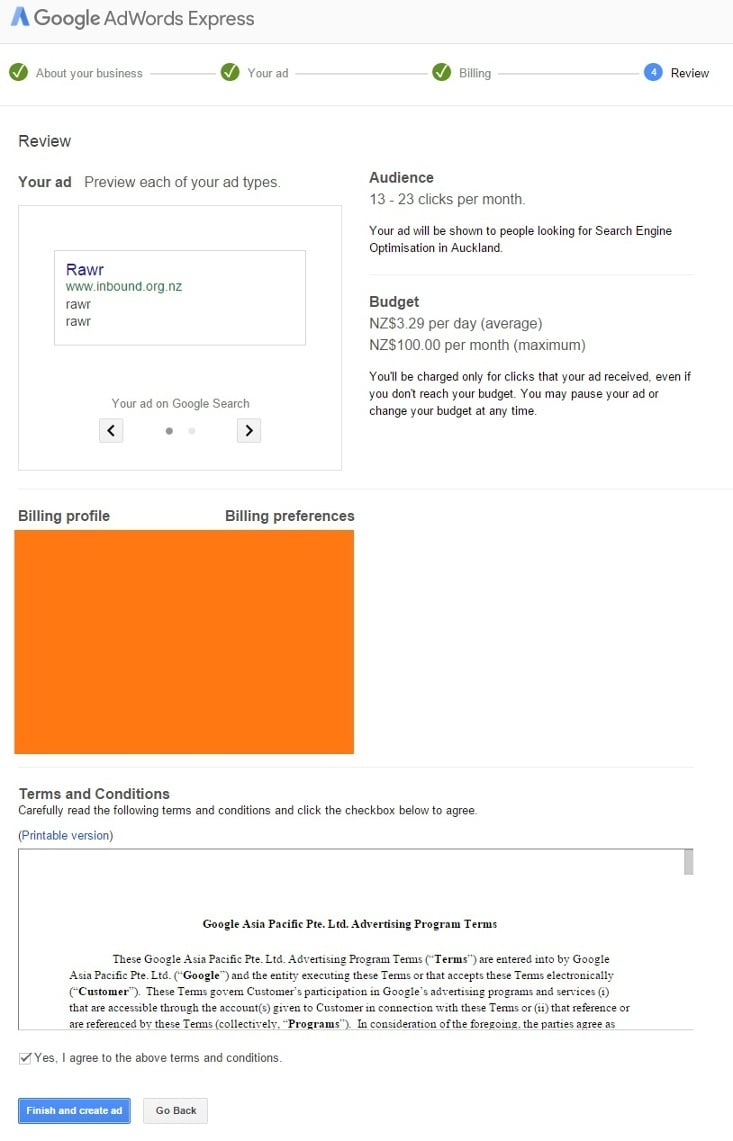
So finish and create the ad and then we're going to pause the ad. Just click the slider I circled (squared) below which toggles the ad from 'active' to 'inactive'.
Final note, if you don't do this step, you will eventually be charged for the ad (I think they give you a few hours before they start showing the ad automatically.
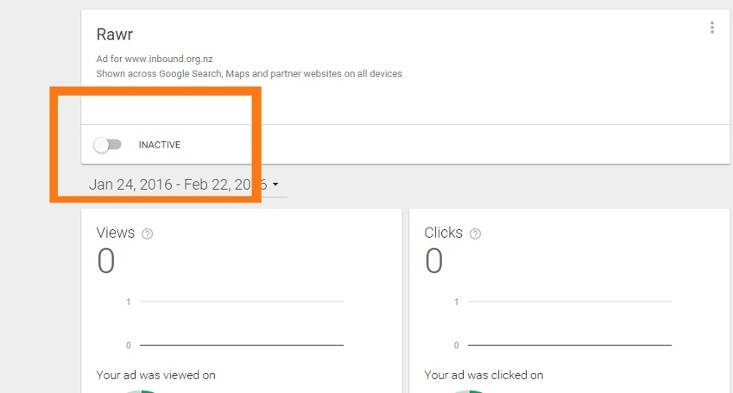
Boom! You're now the proud owner of an awesome free tool that'll let you use its data to help you succeed online!
Simply go back to the link Google Adwords: Keyword Planner and login with the details you just used and you'll be facing the beautiful image below. If you paused you ad like we suggested, you'll face this nice red banner which is warning you that your ads are paused (success!).
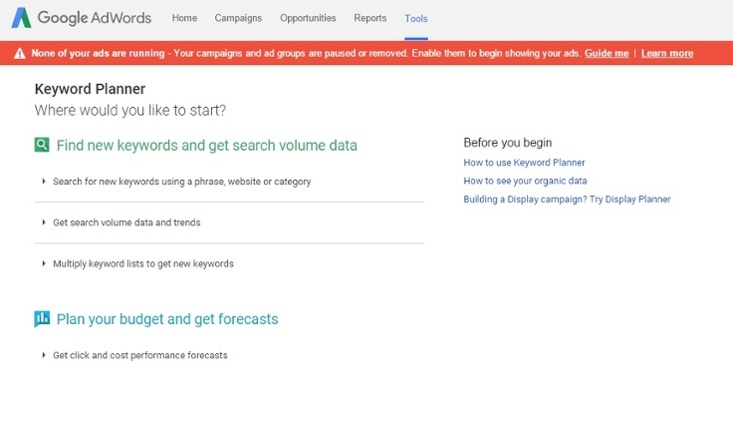
Okay, so you'll want to click the second option 'Search for new keywords using a phrase, website or category'.
Here is where you can type in your market. I decided to test out the word 'roses' because I wanted to see how many searches this gets by itself a month. You can type in multiple keywords here, just separate them by a comma. For example, roses, flowers, buy flowers, etc.
You can also change who you want to target. Since I won't be exporting my flowers overseas I decided to change the region to NZ. You can get even more specific by targeting Auckland, Christchurch, Wellington, Pukekohe and more.
Now we get our monthly searches. If you typed in multiple keywords, Google will break down the results on a per keyword basis below the graph. So it turns out people are searching the word 'roses' 2,400 times a month in New Zealand. Awesome, if our average sale is $50 and we can dominate 10% of the market, we've got some good potential here!
On top of this you can see that the blue graphs show average monthly searches of 30,000. This is because it include similar keywords like:
- Flowers - 8,100 searches a month.
- Rose - 2,900 searches a month.
- Flower - 2,400 searches a month.
- And more.
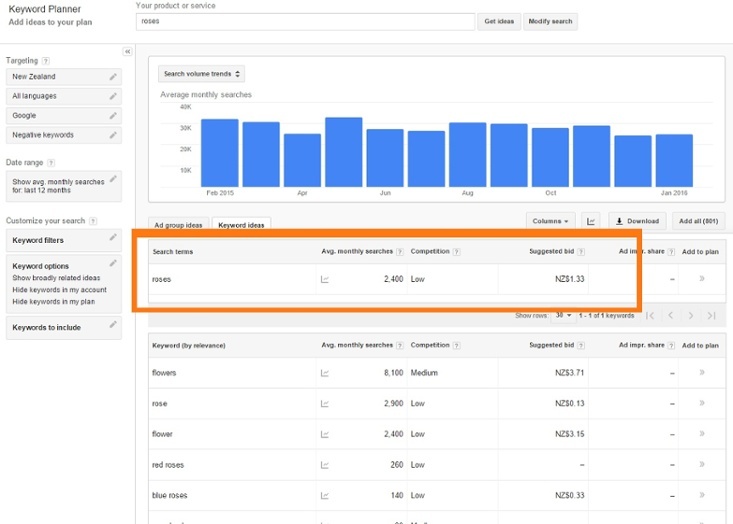
Good work, you've done some research and determined if you should go ahead with your current market or switch by either widening the niche or changing your market altogether!
Now it's time to get serious and move on to step 2. You've done great so far.
Related: Are you looking for some other tools to get started with? Check out our best picks
Step 2 - Do The Research
This might shock you but you DO NOT have a traffic problem. You've probably got either a business model problem or a focus problem. but you DO NOT have a traffic problem.
Here's why...
If I told you that every time you get a visitor to a web page you make $10 in profit, do you think you could get some traffic to that web page? This gives you a potential to spend up to $9.99 to get each visitor and still make a profit!
Most websites boast their traffic stats where each day they're getting 40,000 visits. The problem?
Their visitors they are getting are not pre-framed to buy.
I could go around and share my link on every forum on the internet but chances are people who are on a forum to learn Chinese aren't going to buy my non-exportable flowers! On the other hand if I focus my attention to people who are interested in buying flowers, they will be a much more likely to buy my flowers.
In summary, to get more money per visitor you need to be more targeted with who visits your website. This section is all about focus. In the research section we want to create a killer list of keywords that are highly focused on our target market.
Keywords
Before we go into creating our killer list - what is a keyword? A keyword is a search phrase that we use when we use a search engine. For example if I want to buy flowers I would probably search 'buy flowers Auckland'. That's a keyword.
In the example below, 'what is a keyword' is the keyword!
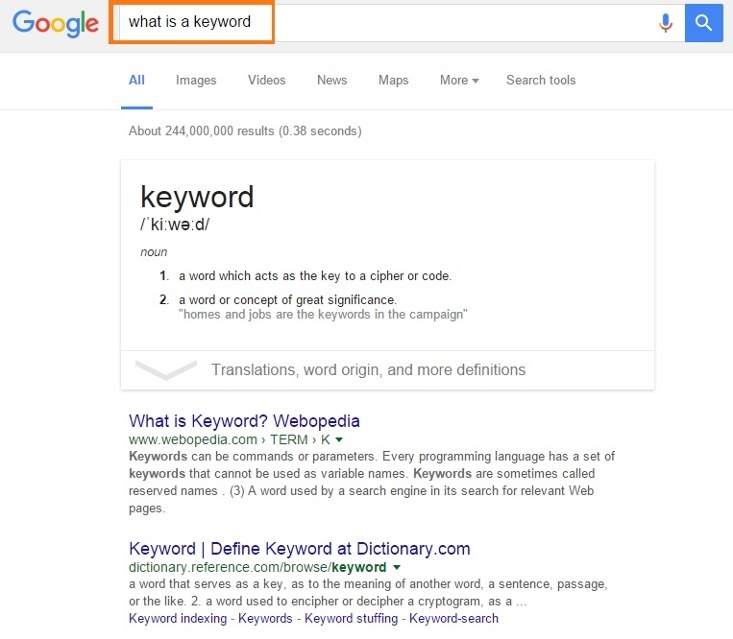
Note that keywords have an interesting characteristic about them - the shorter and more generic the keyword, the more searches each month... but also the more competition and the less likely the person who searched it is going to buy.
The longer and more niche the keyword, the less searches each month... but also the less competition.
So where 'Flowers' will get 8,100 searches each month in New Zealand, there will be a lot of other companies trying to compete with that keyword. On top of this, the more generic the keyword, the less likely the visitor will buy your product. People searching 'Flowers' have a low chance of buying flowers. They might be interested in growing flowers, arranging flowers, eating flowers, who knows?!
On the other hand, 'Buy Flowers Auckland' is a longer keyword and hence will have a much lower amount of monthly searches and lower competition. BUT since it's more focused, people who search this are more likely to purchase when they visit my site!
How To Create A List of Killer Keywords
Okay, time to go back to the Google Adwords: Keyword Planner
Like we did before, we're going to select 'Search for new keywords using a phrase, website or category'. I'm going to get some ideas based off my two keywords 'flowers' and 'roses'. You can go wild here and type in as many keywords as you want or even get some ideas off a competitors website.
So here we have a bunch of different Ad Group Ideas. Google has automatically generated a list of keywords for us AND gone a step further and grouped them up in different search terms.
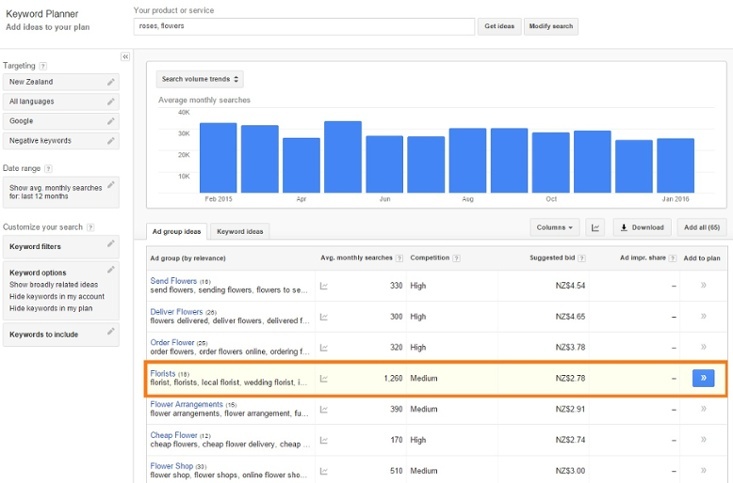
In each ad group, you can click on a title to get the list of keywords Google has suggested for that ad group. Below you can see the results for when I clicked into the ad group: Florists.
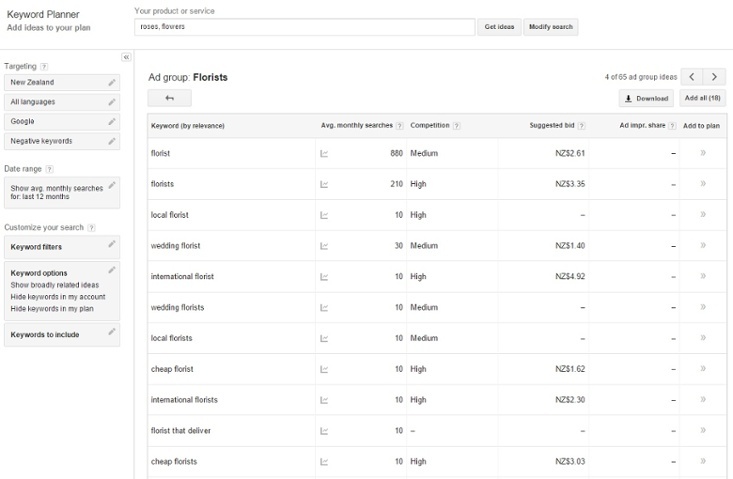
You can see we have a few good ideas and it has already suggested a few long tail keywords like 'wedding florists', 'local florists' and even 'florists that deliver'.
Again let's remember that although that these terms receieve around 15 searches a month, if we group together enough long tail keywords we now have a lot of monthly searches and these searches have a much higher chance of turning into a customer!
Doing the above I want you to create a list of 50-300 keywords. We usually come up with 30-50 keywords ourselves and then use the Keyword Planner to help us expand this out to 300.
You're now holding your own path to success!
This list of keywords is what you'll be focusing on over the next month at least so go ahead, print it off and pin it beside your computer.
The road to success has never looked so easy.
It's Content Time Baby
So, so far we've determined that there is a market out there and we have created a killer list of focused keywords that is going to target this market perfectly.
The question is how do we get this market to start viewing your business?
By creating value-orientated content.
Ever wondered which characteristic every successful company has in common?
They deliver value for free before they ask for the sale.
Most companies that struggle are desperate for money, so what do they instinctively do? They ask for the sale far too much. This scares off customers and doesn't give the customer a chance to get to know the company. On the flip side, the most successful companies around today are the ones that provide a massive amount of value, and more scarcely ask for the sale.
I love to use the example of dating (because business is just like it). If there is an guy or girl who is being super pushy trying to date you, calling you ever 5 minutes to make sure you're still going, and even goes as far as tracking down and calling your parents because you haven't replied in 3 minutes, you're going to be a little scared no matter how attractive or amazing they are. On the other hand, if you met someone and they're being a little flirty and then they mysteriously walk away, that's going to drive you crazy! That person is going to be on your mind.
So, whether you do house inspections or sell flowers, you can create content that attracts your market! And we're going to use your awesome list of keywords to help us out.
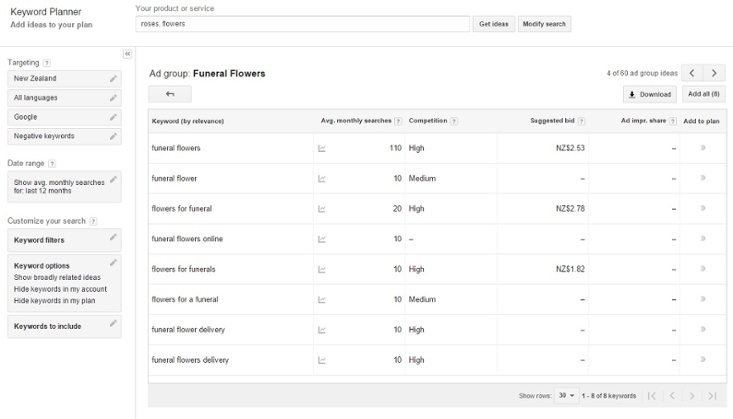
Out of the keywords on my list, the few that stuck out for me as an easy win were funeral flowers. 190 people each month are seaching for this and it's so niche that there's essentially zero competition. Also the average sale would be a lot higher if they're going to be buying flowers for funerals, probably over $200. This means that this niche alone could be earning us ~$40,000 in revenue each month.
So what are we going to do?
Create a page on our site talking about flowers for funerals. Where we deliver, when we deliver, what the arrangements we recommend are as well as a testimonial of someone we've delivered this service to.
What will this do?
When anyone searches for funeral flowers in Auckland, we will come up. Note that sometimes a page will take 3-6 months to start rankings but the more pages you create that add value and target a keyword, the more trusted your website will become in the eyes of Google. For example if we launch a page on a keyword in our industry, we will start to rank in one to two weeks.
It's literally as easy as that. We aren't going to worry about the perfect keyword density or length of content, we can get more in-depth later on. In your content just ensure that:
- It makes sense.
- It is helpful to the person reading it (adds value).
- It is set out in an easy to read (and share) way.
We can also write a blog post about the process of how we get the flowers and then deliver them to the funeral.
Content like that works in two ways:
- First it will appear on search engines getting you more people onto your website.
- Second it shows potential buyers that you're not just a website but real people.
I've done business with companies countless times simply because they show the people behind the website. It massively increases the rapport they create and I feel much more connected with their business.
Finally with content generation, as you work your way through the list, try as hard as you can to put the keywords in the title. For the keyword 'florist deliver' I would have 'FlowersRUs Florist Deliver FAQ' as the title.
Since you should have 300 keywords you're probably wondering about how long this is going to take to work through.
What we do is first work on the 30-50 keywords we created at the start since these are the main keywords we will be focusing on during our campaign.
The key here is to make sure everything you do aligns. Your Twitter posts and Facebook posts should all reflect the theme of your campaign and the best campaigns are planned out a month in advance.
Everyone in your business should know what the focus of this month is and constantly strive to stick to the theme.
Step 3 - Setting up the Net
Here is one step that is going to blow your mind.
This is one step that if missed will massively reduce your chance of success. If you are doing something like this already go ahead and pat yourself on your back.
This is all about capturing the leads.
I've had so many clients who have spent near 6 figures on marketing campaigns and months on SEO content and it has all gone to waste because they didn't spend a moment to set up the net!
It kills me every time I see it so I forbid you to not do this step (that's right, you heard me).
When someone lands on your page, there should be a way to capture the visitor and turn them into a lead.
If you haven't figured it out yet, I'm talking about setting up and building an email list.
An email list allows you to keep unconverted leads, continuously convert your customers and provides a way to market to your audience for free for life.
A lead's email should be treated like gold.
So how do we go about setting up the net?
First you need an email provider. We use MailChimp. It's easy, affordable for a small business and is based around a monkey so everyone wins.
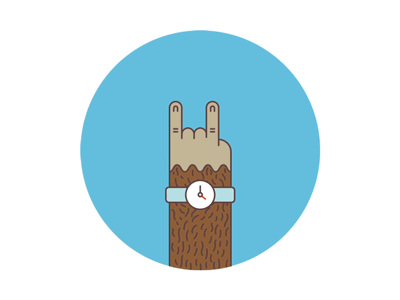
Second, you need to add a form to your website to allow people to sign up to your email list.
We will soon be releasing some articles covering lead capture and for now you can use MailChimp's form creator.
There are numerous places you can get people to sign up to your list.
The Bottom of a Blog
One of the most common places you will see a sign up form is at the bottom of a blog post. Here is an example from a company called GrooveHQ.
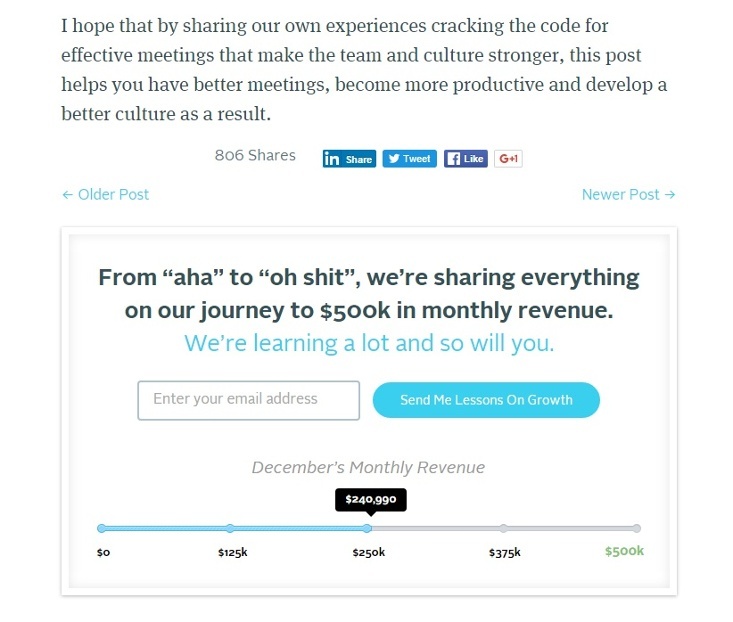
Landing Pages
Another place you'll see a sign up form is on a landing page. For example you can see below that we have a page dedicated to a free inbound marketing consultation. This page has a conversion rate of 56%, and brings us in hundreds of leads a year.
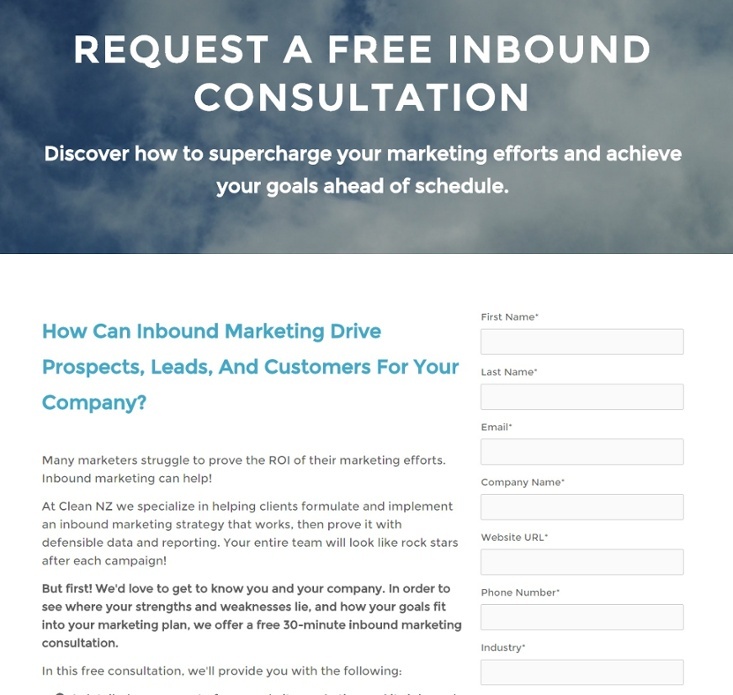
Pop-Ups
Finally, you definitely would have seen this next example yourself.
This is what we call an 'exit intent' pop-up and will appear when a visitor tries to leave our website. This is non-invasive and has no Google penalties as it doesn't obstruct the person closing the page. This is an example from InboundBnd and as you can see, it's a pretty good way to turn visitors into leads who otherwise would have dissapeared and never returned.
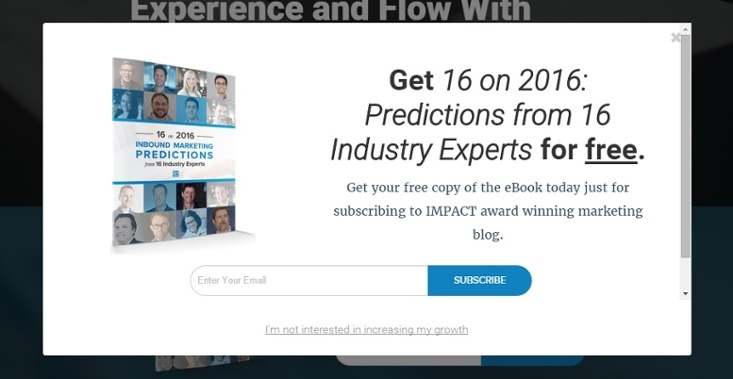
These are just a few ways to gain leads and I want to mention something very important.
You must offer something irresistible! The most common offers are a free consultation, inspection or report.
In regards to sending out emails, one email a week is enough! If someone has given you their email they have placed trust in your company. Do not go ahead and destroy this with too many emails.
In regards to what to send, at Inbound we send an email a week containing something of massive value, an update about our company and usually a goofy photo. Once every few weeks, we send out an offer (for you this could be a sale, a Vallentines promo, whatever!). Again the reason why we send out an offer every few weeks and not ever day is because you'll get more response if you focus on delivering value instead of constantly asking for the sale.
Step Four - Rinse and Repeat
Fantastic! You've done the hard work and now you're ready for some success. All that is left is the rinse and repeat.
What you've just done is create the foundations for success online. Like I mentioned before, I know hundreds of websites and blogs that are getting 40,000 visitors a month but making only $100-500. This is because they didn't set up a solid foundation to target quality visitors, add massive value or have a way to capture leads.
Thankfully I know that you'll never have this problem. I have some clients who only get 100 visitors a month on their website but are making $10,000+. This is the real sign of success.

Did anyone else notice the man in the bottom right corner? Awesome dance moves.
So now we've set up the solid foundations, what's next? What's next is to kickstart the whole process of SEO for your business.

Section 2 - The SEO Boost
If you've made it this far, we are impressed, and I know you will be soon with your results.
If you remember, right at the start we talked about Google's new focus on Local SEO. Again this is because Google's main mission is to deliver the most revelent and value driven results and there's no use of it showing me a hairdresser in Manhatten if I live in the middle of Otago!
So in this next section we're going to go a little more in-depth into search engine optimisation, and like we did before, show you step by step how you can implement and see serious results through SEO.
Local SEO - Google's Favourite Cup of Tea
Google is emphasing local search which is great news for you. Below are two examples of just one way Google is helping out local businesses.

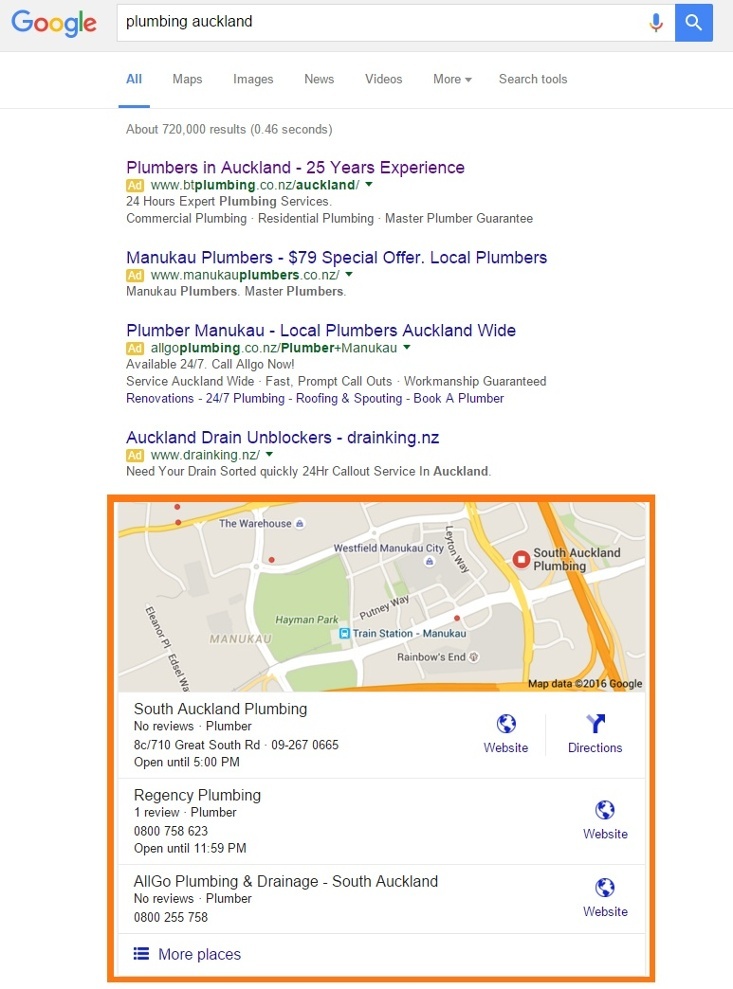
And even if you are an international company, just think if every branch was superchanged to receive more sales. For example, although we help clients all around the world, the more Google emphasizes local search, the more clients we're acquiring in Auckland... for free.
I hope you take a moment to really let that sink in. This Google Local section (highlighted in orange above) is appearing above organic results. Companies are spending $100,000+ a year to maintain that number one position on certain keywords and I'm telling you here today that your local business can appear above that! Whaaaaaaaaaaaaaat?
This is why I'm telling local, national, and even international companies to get on local! Local SEO doesn't provide small improvements to your online presence, it has the potential to double and even triple profits!
So I hope you finally understand that local is important. If you still haven't quite got it yet, put a Post-It note on your computer to remind yourself every day!
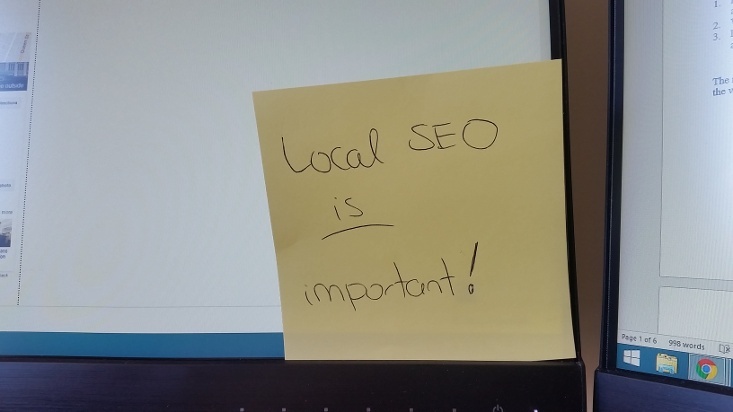
See, we lead by example ;)
Setting up your local presence all starts with Google Business. Google Business is a free tool that Google provides and it acts kind of like a Facebook company page or a LinkedIn business page. The difference is Google Business has taken some serious steroids.
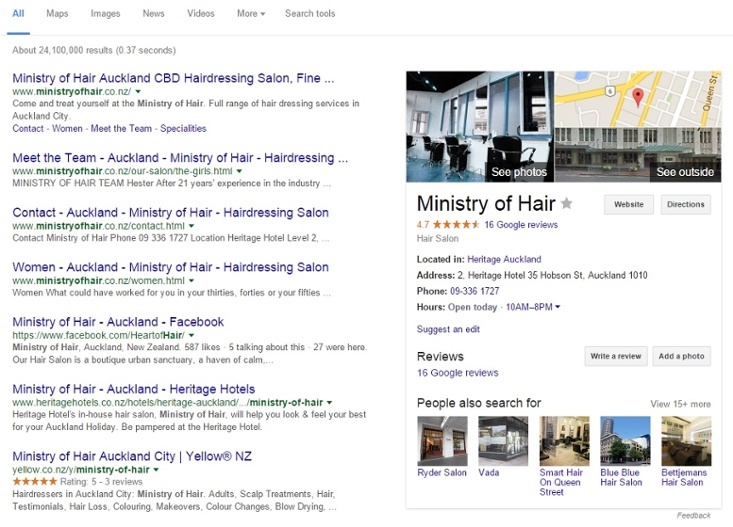
Two more things really stand out about local SEO. The first is the fact that you get so much real estate on the front page of Google. Take a look at the Ministry of Hair in the image above. They get placement on the top of Google AND they get a big pop-out section on the right describing where they are on the map, their reviews, their hours, their phone number and the ability to go to their website and ask for directions.
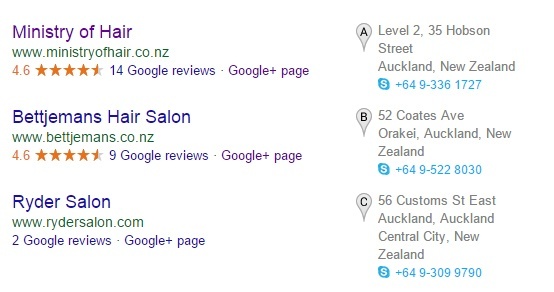
Look how easy it is for people to pick up and call you! Even on business directories like Yellow, you have to pay upwards of $150 AND they show all of your competitiors.
So you're probably beginning to understand the power of Google and local SEO for your business...
So How Do I Set Up My Business Local Page?
Like we said before, Google wants you to sign up and get seen for local results. All you need to do is head here to submit your application!
Once you hit the 'Get on Google' button, type in your business name and hit the 'I've correctly entered my name and address' option. This gives you the opportunity to claim your business which currently isn't on Google. If you're business IS on Google, you can apply to become the owner of the page (sometimes Google automatically creates these for businesses).
For online only businesses just enter your home address for now and I'll teach you a hack to get your business placed in the center of town without needing to have a physical location.
The next step is the most important step in the system - getting verified.
This is a must! You won't get on the front page of Google without verification. So if you're a physical business, just get verified the classic way. Hit the 'Mail me my code' and you'll receive a postcard in 1-2 weeks with the verification code on it... easy.
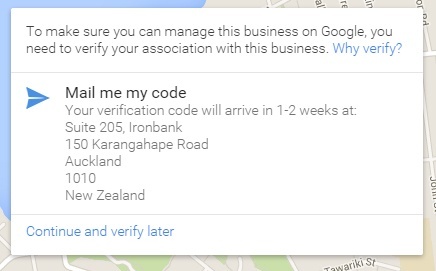
If you work from home and don't want people to visit your house, or if you are an online only store don't worry! Here is the hack that not many know about.
All you need to do is get the code sent to your home, again this won't appear on Google until verified so don't worry about privacy.
Once you have the code, verify your current address.
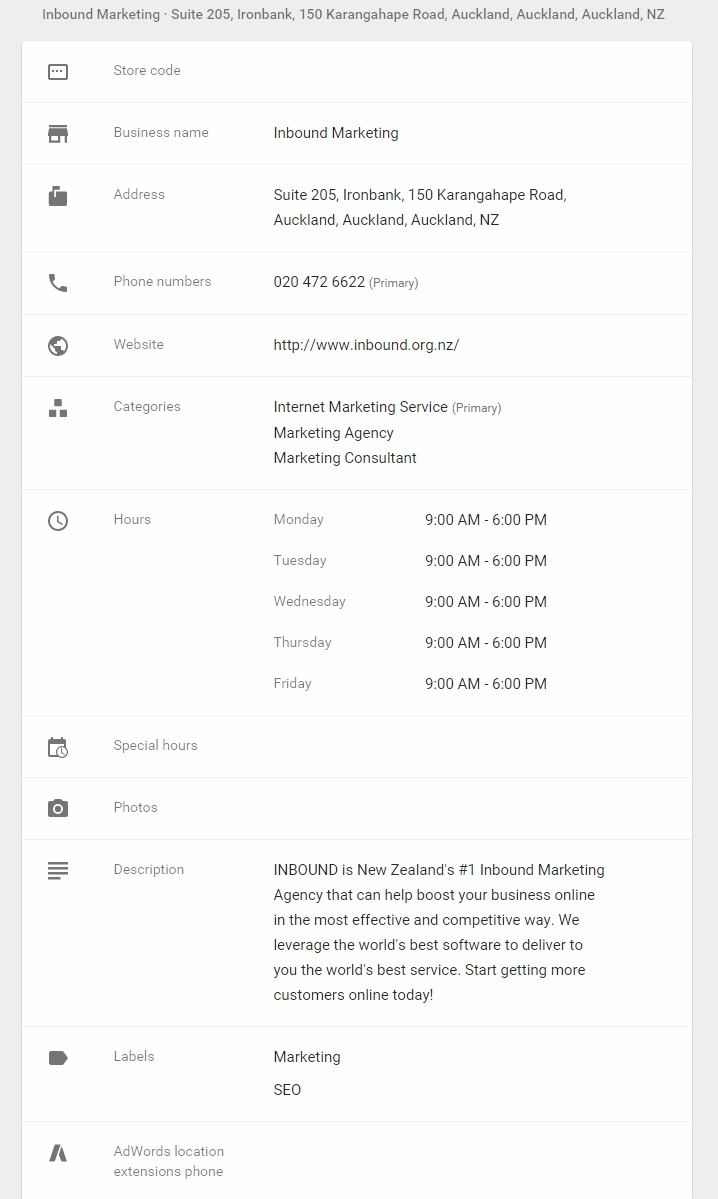
Now you've verified your address, you can change it with no need to verify again! You can literally put yourself in the middle of town and get the most exposure from local search without having to have a brick and mortar store. Now this works really well for online businesses or digital agencies but if you're a hairdresser or a physical store and expect people to visit you, you shouldn't do this. Otherwise you're sending your paying customers on a wild goose chase in the middle of the city instead of coming to your office!
Plus you get some awesome insights like views, and clicks. Our clicks are low since we recently changes the business domain but even just having the Google Business page we're getting an extra 221 views a month which is awesome!
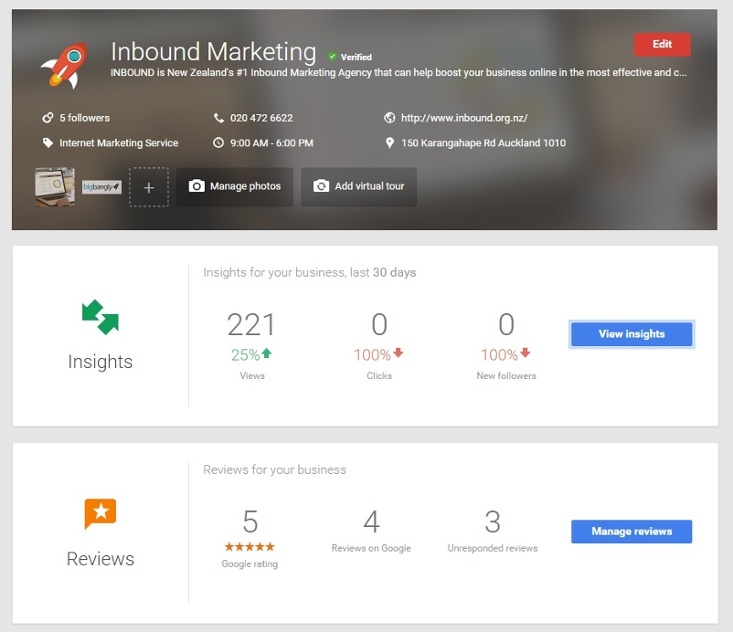
So there you go, you've now just complete the hardest step in getting your local business on the first page of Google!

Section 3 - Quick Wins
Alrighty! If you're reading this then I'm truly impressed. You're the kind of person we love to work with. This section is all about quick wins you can make today to start quickly out-ranking your competition.
5 Factors To Rank Ahead Of Your Competitors
Now we'll go through a bit of what really makes your business appear above other businesses.
I'll also make sure this section is in English as a lot of 'SEO experts' like to confuse their clients so they can charge more which isn't really fair.
For this section, lets treat Google like a person (as it almost is!). Both Google and people are after the same thing; clear messaging, a great looking and easy to navigate site, and proof that other people are also loving what you do.
So without further ado, the main factors!
On-Page Factors
This is the message your business sends on your website.
At Inbound we recently decided to make our message a little bit clearer. I wonder if you can figure out what we do...
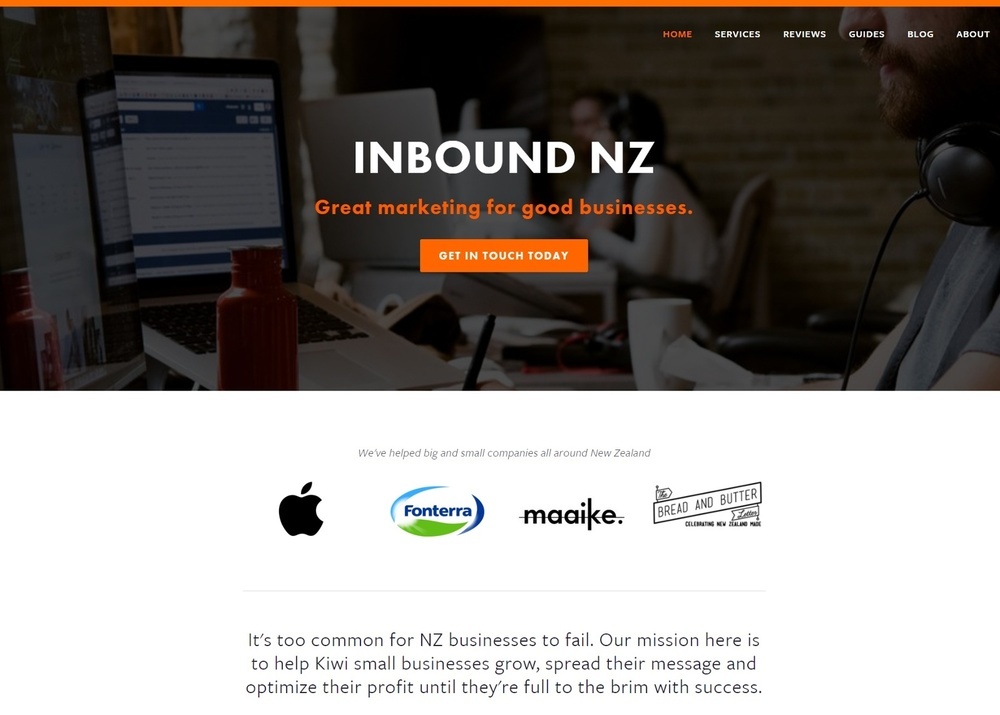
A clear message is vital. If you cut hair, someone visiting your website needs to be able to tell you cut hair in the first 5 seconds. You need to have other pages describing what hair you cut, how you cut hair, what people can expect etc.
If people (and Google) can't clearly figure out you cut hair, you're in trouble!
Off-Page Factors
This is all about what other sites are linking to you. If you have a lot of highly trusted sites linking to yours, Google will take this as a signal that you're trusted. If no one is linking to you... uh oh.
It's kind of like how many friends you have on Facebook. If you add me as a friend on Facebook and I looked at your profile, if you have 4,000+ friends I'm going to think you're famous! If you have 5, then you probably don't use Facebook. The more friends you have, and the more mutual friends we have in common, the more likely I am to think I know you and add you back (since if your friends with my friends, you must be awesome!).
Bonus: If the sites linking to your website are relevant and are on the same topic as your business, you're going to get bonus points from Google. If the sites linking in are weird sites that have nothing to do with your company, you might be in a little bit of trouble.
My Business Page Factors
This is all about your Google+ and citation. a rough idea, any business listing website that mentions your name, address and phone number is a citation. Examples include Yellow, Yelp, Foursquare and the Localist.
The more citations you have that point to your website and your shop, the more likely you are to appear higher on Google.
Bonus: Citations must be consistent! Making sure your name, address and phone number is the same in each citation is the most important rule of citation building!
Reviews
This is a little bit self-explanatory but it needs to be noted -reviews positively affect your search engine rankings!

I'll give you three guesses at why these companies are ranked the way they are.
Behavioural and Personalization
This is all about personalizing your Google+ account, adding photos, business hours and reviews.
The behavior side of it has to do with people on your site. If you haven't taken a look at Google Analytics lately, jump on and have a look now.
If you haven't got this set up, SET IT UP! It's free and gives you a massive insight into what people are doing on your website.
Here is a screenshot of the analytics from one of my sites:
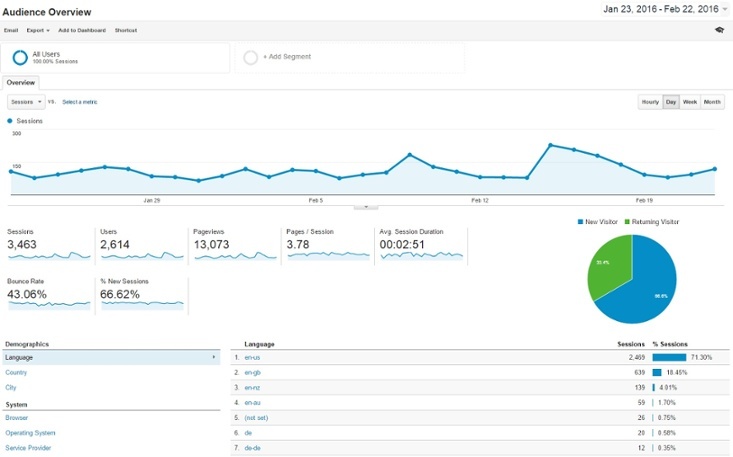
You can see the bounce rate, the average session duration etc. Basically, the more time people spend on your site and the more pages they visit, the more Google will know that they are appreciating what you have to say and you will get a boost in the search ranking!
Mobile Friendly
This is important! On April 21st Google did a smackdown on non-mobile friendly websites. This means if you have a website that isn't mobile friendly, you won't be appearing on Google on mobile phones.
Considering there are now more phone searches than desktop and laptop searches, this is important! So head to Google's free Mobile Friendliness Tool and see if you pass the test. If not, get it sorted today!
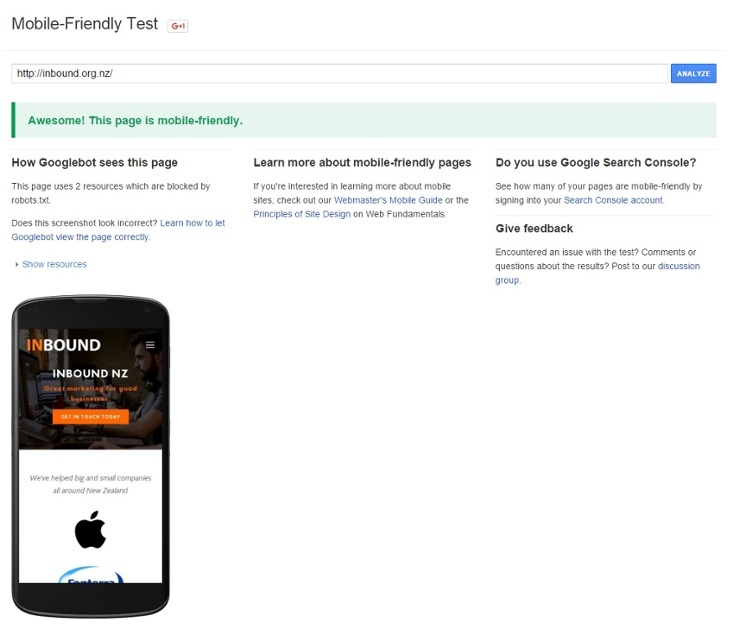
We passed!
Website Speed
How fast your website loads is another massive factor! Although it only plays a small part in getting on the front page of Google, if you have a slow loading website, no one is going to wait around to see what you do.
If I have to wait more than 5 seconds for a website to load, I'm instantly going to close the browser (and I'm sure you would too!). If the website happens to load as I go to close the browser, I'm going to have such a negative association with your website that only the best headline in the world will convince me to stick around.
If you want a free website test, click here!
Conclusion
Getting to the front page of Google isn't hard if you know exactly what you're doing, and hopefully by now you would have:
- Researched your niche for financial viability
- Created a list of keywords that you're going to focus on for the next month
- Been able to estimate the revenues once you're ranked for each term
- Set up a Google My Business Page
- Have created some citations for your business
- Have a mobile-friendly site
- And finally have a fast loading site
To be completely honest, if you've done everything in this guide, you're going to be digitally ahead of 99% of your competition so a massive round of applause goes to you.
Our goal here is to help get your small business in front of the people who care, so if you loved this post, make sure you share it around!
If you have any questions, make sure you comment below as I personally read and respond to every question asked.
Finally, if you want to take your business to the next level we'd love to catch up over a coffee. During this coffee we'll help you figure out an exact roadmap to get from where you are now, to where you want to go. And with over 8 years of experience, the best knowledge in the industry, and the biggest partners in the world (like Google, Facebook, Microsoft and HubSpot) we're here to help your business succeed.

